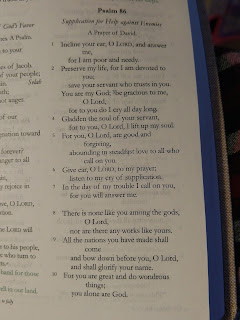Observation: Jesus calls twelve guys to his side and calls them "apostles" (Which is Greek for "sent ones") giving them authority to do pretty much exactly what he's doing: share the message about God's kingdom, and cast out demons.
Application: First, I still have some culture shock about the fact that Jesus calls only dudes to his side. No women. Argh. Yes, it was the first century, I can't expect things to be done in a completely equitable twenty-first century way, but it's still something I have to get over to get anything out of this message. I'm just glad that in our own time Jesus has called a great many women apostles, some of whom have helped form me in faith.
But after I get over that, what stands between this text and me is how profoundly undemocratic Jesus' method seems to be. No try-outs, no master class, just a small group of special people whom Jesus hand-picks for intensive learning and service. How do you think the people who weren't picked feel? Aren't we all God's children? Why them? Why not me?
I've had similar complaints about many small-group discipleship ministries that purport to be based on Jesus' method. They seem to create cliques, or different "levels" of Christian, an "in" crowd and an "out" crowd. Even 3DM, the discipleship model which has formed and changed my spiritual life and ministry, is not immune to that criticism.
What I've learned, however, is that a supposedly "democratic" model of Christian leadership which seems the de facto model in congregations, which opens every opportunity to everybody, in which everybody is welcome (and sometimes begged) to do everything, does not really offer spiritual growth to anybody. Signing up on a sign-up sheet for a ministry or learning opportunity, and showing up when you have nothing better to do, will do precious little to unlock the spiritual gifts God has given you, nor serve the world in its deepest need.
Real discipleship, like Jesus practiced, is about deepening relationships. It works on the assumption that you can only empower people to do what you're doing if you feel mutually called to work together. It doesn't happen by accident. Jesus recognized specific gifts in specific people, and he knew that working more intensively with them would mean they could become effective leaders, who would in turn call disciples who would become effective leaders in their own right. Sure, Jesus, being the son of God, could probably could have just "downloaded" heavenly wisdom into 5,000 people on the hillside and made them all stellar disciples. But what would have happened when all 5,000 of them died, without knowing how to disciple others?
Those of us who have been baptized into Christ, and those of us on a journey of following him, are here because Jesus "played favorites." He didn't treat his disciples with any more love than anybody else--if anything, he expected a whole lot more of them--but he did understand that these were the guys God had called to work by his side. And I guess we can be thankful that he didn't just put out a sign-up sheet or create a Facebook event. Movements of the Spirit rarely form that way.
Prayer: Jesus, I pray you would call me into deeper discipleship. I am sort of charting my own course right now, and frankly I could use more structure. Maybe some reading this could use the same thing. I pray you would call spiritual mentors, and groups of fellow-travelers, for us who need it, and for those already in those relationships, may they bear the fruit that is needed to serve your world. Amen.
































